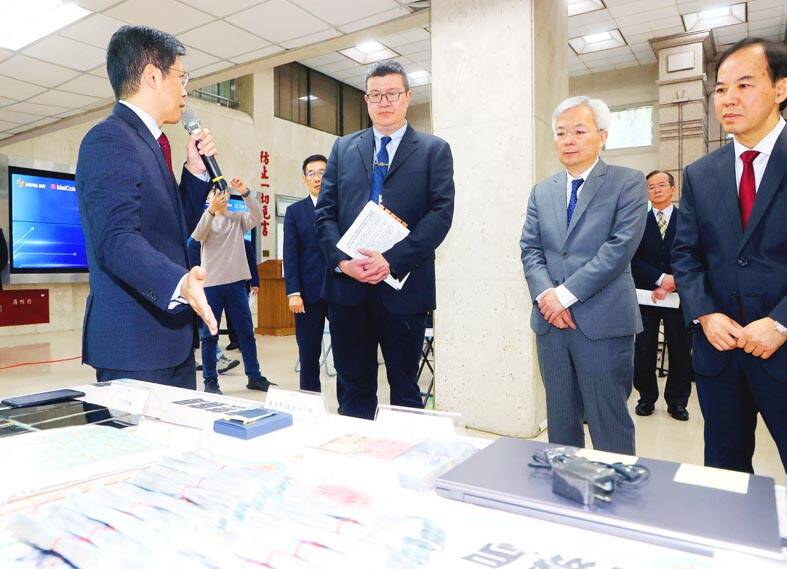A campaign against fraud has resulted in police breaking up 633 alleged scammer organizations and identifying 3,992 suspects, the National Police Agency (NPA) told a news conference at the NPA headquarters in Taipei yesterday.
The agency carried out a series of operations targeting lending and money laundering activities using cryptocurrency, Anti-Fraud Command Center head Ma Shih-yuan (馬士元) said.
The operations took place from Jan. 8 to 17, officials said.

Photo: CNA
Financial Security Commission officials and Taiwan Virtual Asset Service Provider Association representatives also attended the news conference to announce the launch of a public-private task force to fight crypto-based fraud.
The enforcement operations led to the confiscation of alleged criminal proceeds valued at more than NT$971.43 million (US$29.6 million), disbanded 271 money lending organizations, with 340 suspects identified from the organizations, Ma said.
Police uncovered 125 instances of alleged money laundering involving cryptocurrency, with 143 suspects to be prosecuted, he said.
A well-educated public that is aware of the risks posed by scammers, and cooperation between public and private-sector actors are crucial to counter fraud, a criminal activity characterized by constant innovation, Ma said.
Separately, Criminal Investigation Bureau 4th Investigation Corps Commander Tseng Shun-kuang (曾順光) said that his unit last year cracked down on scammers who allegedly defrauded 20 people of a combined NT$100 million.
The group, whose members included financing companies, scriveners and an unregistered lender, conspired to scam people with fake investment schemes before taking out mortgages on the properties of those it targeted, Tseng said.
Police questioned 17 suspects and found sufficient material to recommend that the Hsinchu District Prosecutors’ Office charge them with aggravated fraud, money laundering and racketeering, he said.
CIB International Criminal Affairs Division Chief Lee Kun-ta (李昆達) said that a review of records and data helped police identify a suspected money laundering operation in Taoyuan that worked for Chinese scammers.
The main suspect in the case allegedly created an online shopping platform to trick Chinese into giving away their personal financial information, he said.
The accounts of targets were drained and used to buy tether, a cryptocurrency, which was used to conduct nominal transactions to hide illegal profits from gambling and other schemes, Lee said.
This money-laundering group processed about 100 million yuan (US$13,77 million), he said.
In January, a task force raided facilities and residences connected to the case, and recommended that the Taoyuan District Prosecutors’ Office indict six people on charges linked to the scheme, he said.
The investigation is ongoing, as police believe the suspects worked for a higher authority in one or more organized crime groups, Lee said.

Right-wing political scientist Laura Fernandez on Sunday won Costa Rica’s presidential election by a landslide, after promising to crack down on rising violence linked to the cocaine trade. Fernandez’s nearest rival, economist Alvaro Ramos, conceded defeat as results showed the ruling party far exceeding the threshold of 40 percent needed to avoid a runoff. With 94 percent of polling stations counted, the political heir of outgoing Costa Rican President Rodrigo Chaves had captured 48.3 percent of the vote compared with Ramos’ 33.4 percent, the Supreme Electoral Tribunal said. As soon as the first results were announced, members of Fernandez’s Sovereign People’s Party

MORE RESPONSIBILITY: Draftees would be expected to fight alongside professional soldiers, likely requiring the transformation of some training brigades into combat units The armed forces are to start incorporating new conscripts into combined arms brigades this year to enhance combat readiness, the Executive Yuan’s latest policy report said. The new policy would affect Taiwanese men entering the military for their compulsory service, which was extended to one year under reforms by then-president Tsai Ing-wen (蔡英文) in 2022. The conscripts would be trained to operate machine guns, uncrewed aerial vehicles, anti-tank guided missile launchers and Stinger air defense systems, the report said, adding that the basic training would be lengthened to eight weeks. After basic training, conscripts would be sorted into infantry battalions that would take

GROWING AMBITIONS: The scale and tempo of the operations show that the Strait has become the core theater for China to expand its security interests, the report said Chinese military aircraft incursions around Taiwan have surged nearly 15-fold over the past five years, according to a report released yesterday by the Democratic Progressive Party’s (DPP) Department of China Affairs. Sorties in the Taiwan Strait were previously irregular, totaling 380 in 2020, but have since evolved into routine operations, the report showed. “This demonstrates that the Taiwan Strait has become both the starting point and testing ground for Beijing’s expansionist ambitions,” it said. Driven by military expansionism, China is systematically pursuing actions aimed at altering the regional “status quo,” the department said, adding that Taiwan represents the most critical link in China’s

EMERGING FIELDS: The Chinese president said that the two countries would explore cooperation in green technology, the digital economy and artificial intelligence Chinese President Xi Jinping (習近平) yesterday called for an “equal and orderly multipolar world” in the face of “unilateral bullying,” in an apparent jab at the US. Xi was speaking during talks in Beijing with Uruguayan President Yamandu Orsi, the first South American leader to visit China since US special forces captured then-Venezuelan president Nicolas Maduro last month — an operation that Beijing condemned as a violation of sovereignty. Orsi follows a slew of leaders to have visited China seeking to boost ties with the world’s second-largest economy to hedge against US President Donald Trump’s increasingly unpredictable administration. “The international situation is fraught